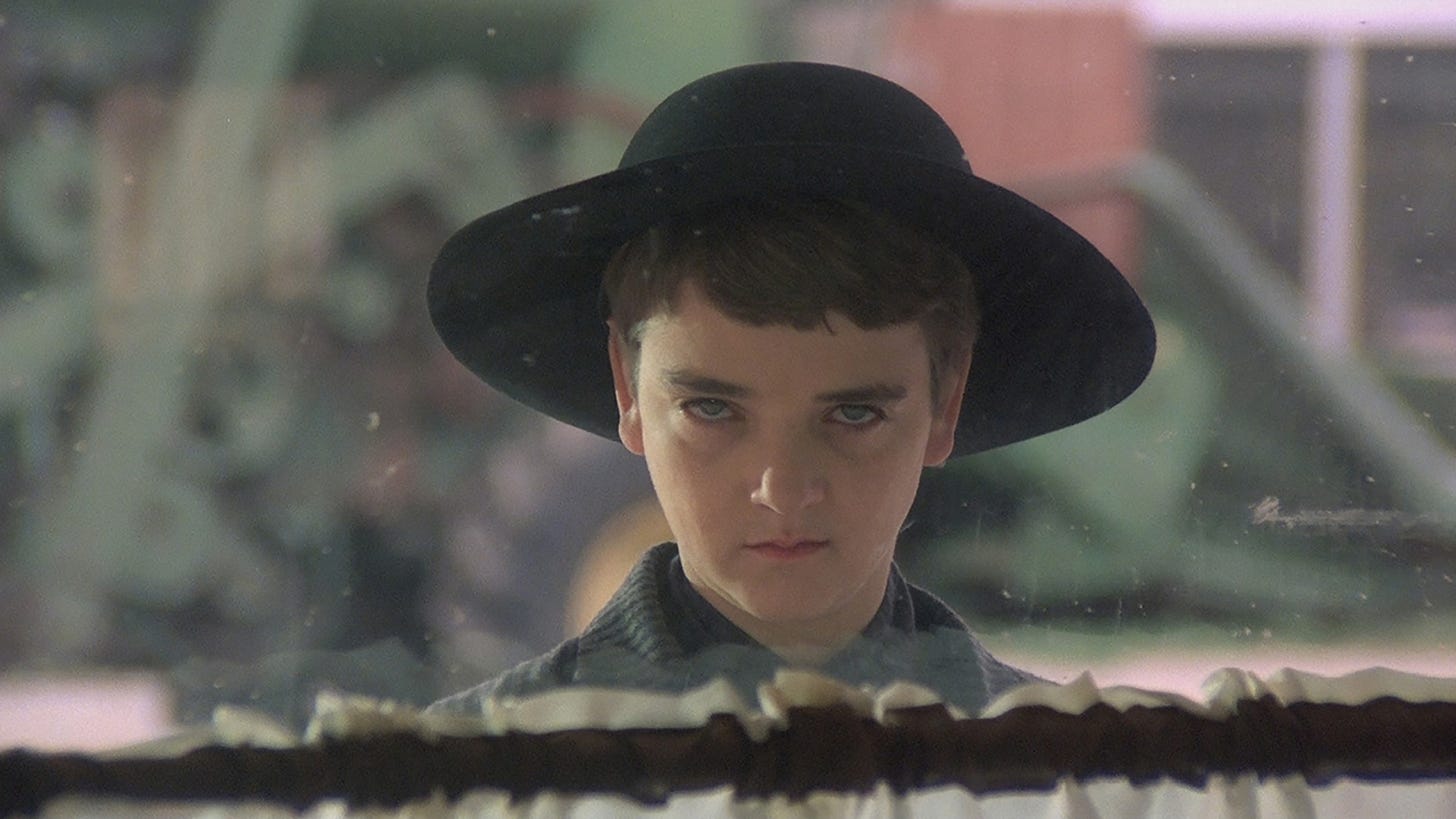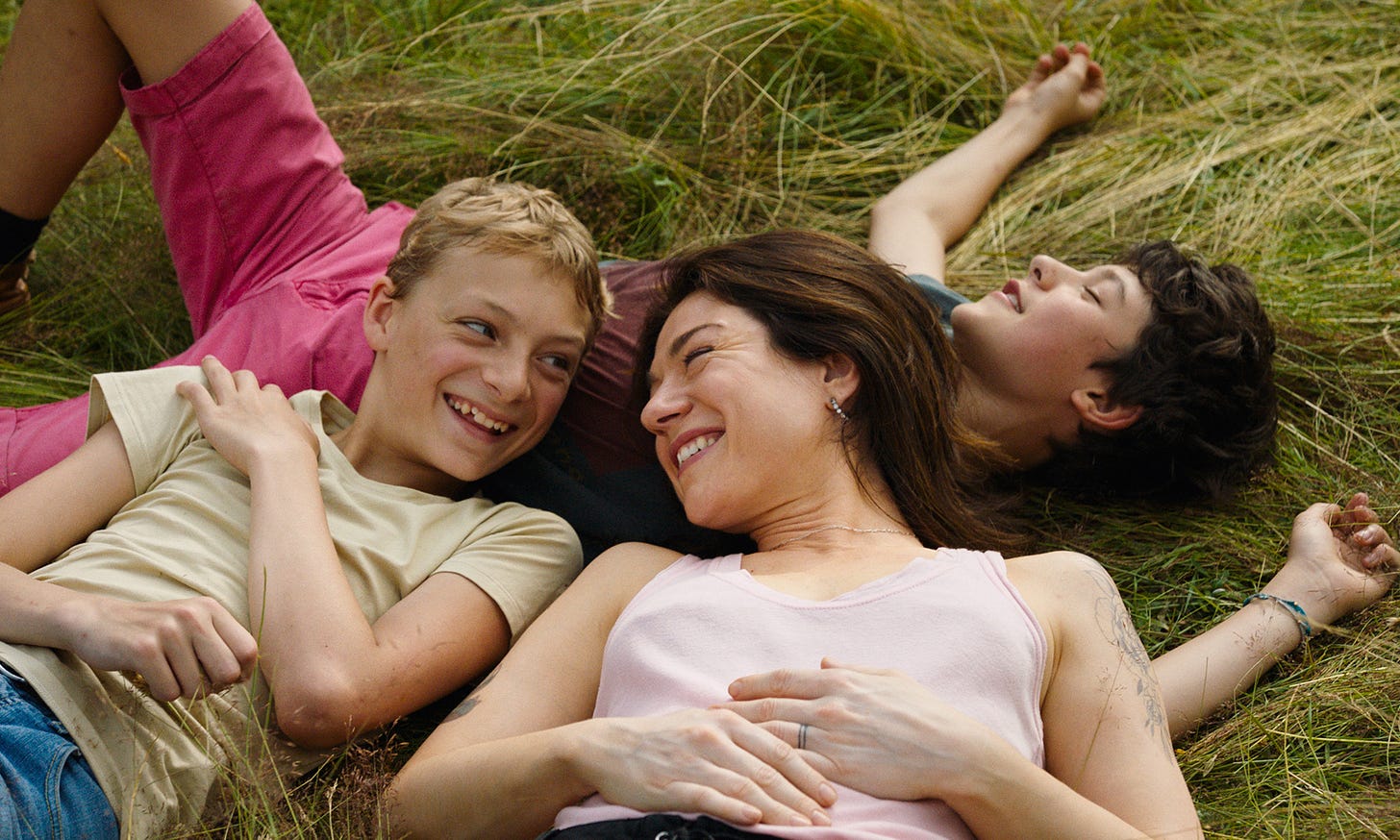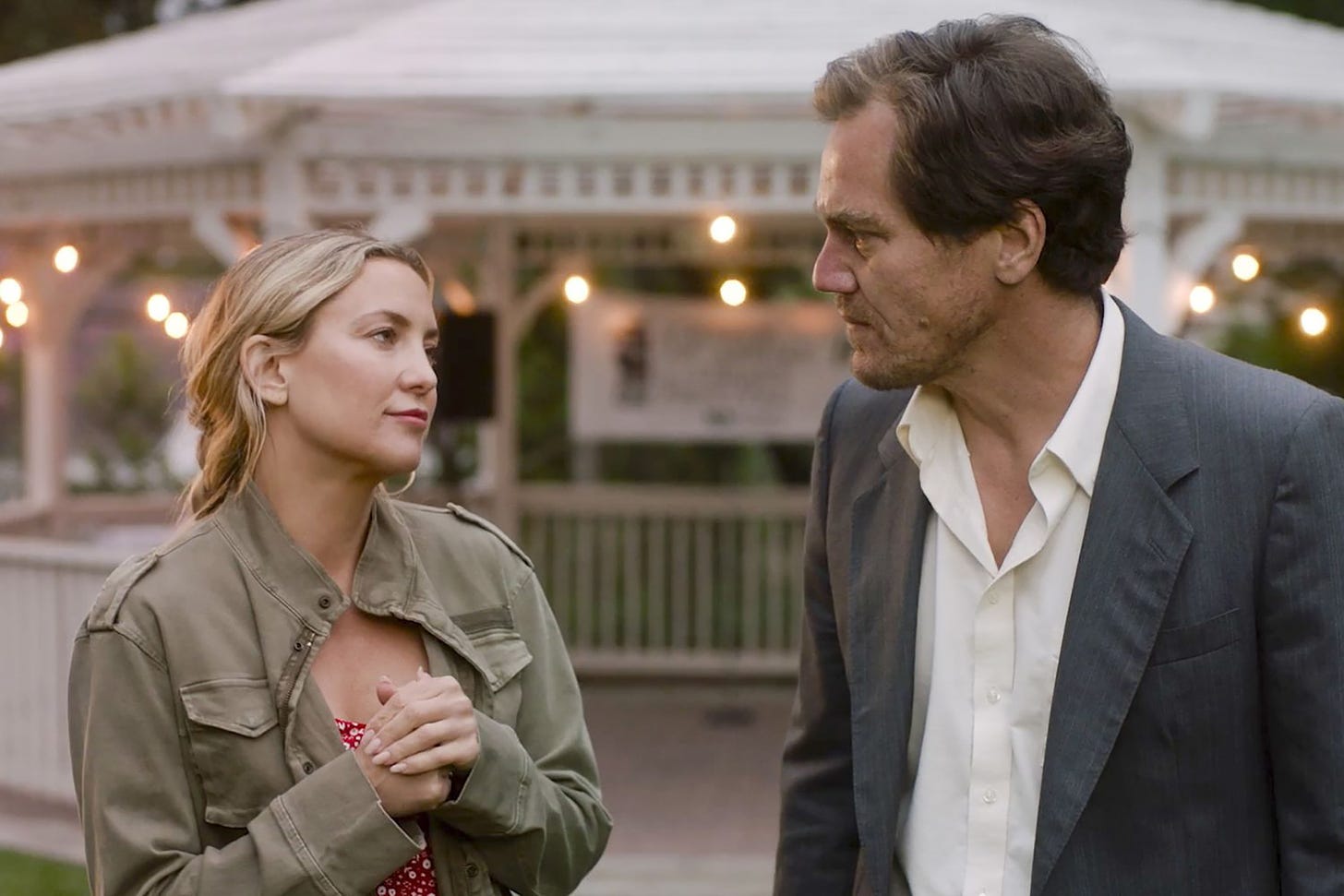It wasn’t a great week of movie watching. Not that I anticipated it would be when I put two different adaptations of CHILDREN OF THE CORN on my docket. Did get to an Oscar nominee that I liked, though. So that was nice. Would have been more, but I spent a bunch of time on March’s Posterized at The Film Stage too.
I don’t know if it’s a cyclical/seasonal thing or if the streaming shake-up begun by Warner Bros. is really taking hold of the industry (WB is expiring all their digital codes now too to drum up more revenue after letting them remain active for years past printed dates), but the “New to Streaming” section of these newsletters has really shrunk of late. Between scaling back on streaming-only titles and shelving others, there’s been little to mention. Maybe the streamers are all just pivoting to episodic programming—which, to be honest, is probably what they should have been focusing on from the start. Or maybe this is the lull of market-wide restructuring with a return of films coming soon.
And then there’s the news Movies Anywhere is shuttering both its Screen Pass program and Watch Together feature on June 1, removing all forms of “sharing” (save “illegal” password-sharing) from the platform. I honestly didn’t use either (besides giving Screen Passes away), so it’s no big loss to me. I purchase my films from iTunes, rip the DRM, and put them on the Plex server my partner set-up to let my family and her friends go ham on our library. But what reason is there to remove those features besides yet another play at saving money? You have to imagine each “share” costs something in licensing fees (only select titles were available at a time). Quickest way to save a buck is turn your site back to purchase-to-play only.
What I Watched:
CHILDREN OF THE CORN [1984]
(streaming on multiple sites including Shudder)
The reason Stephen King’s short story CHILDREN OF THE CORN is effective is precisely because it leaves its mysteries to the reader’s imagination. It also rejects mainstream horror’s need to provide a happy ending. So, what does Hollywood do upon adapting it to the big screen? The complete opposite. They give form to the implicit. They remove internal conflict from Burt (Peter Horton) and Vicki (Linda Hamilton), transforming their antagonistic entry points to an unexplainable world (the real lead of the story) into heroic outsiders come to unwittingly save a town of lost souls from themselves. The result hardly bears resemblance to King’s original work beyond its superficial shell of a setting. It’s merely screenwriter George Goldsmith and director Fritz Kiersch’s sanitized and inert fanfiction.
One of my favorite parts of the source material is the discovery of how long Gatlin, Nebraska has laid in disuse. The gas prices and diner menu. Burt and Vicki are so flabbergasted by the twelve-year time warp they’ve stepped into that they actually stop arguing for a second to contemplate what it means. That’s all gone in the film. Not only has the distance been truncated to three years, but the first thing we see is why that gap was created at all. The least Kiersch and company could have done was draw out the uncertainty and throw in a flashback later on. Starting with a prologue undercuts the religious commentary completely by putting a face to the carnage before we even meet the “outlanders” stumbling onto its secrets. It gives us a villain and makes us wonder if talk of “He who walks behind the rows” is nothing but a scare tactic.
Burt and Vicki have zero animosity beyond weak dialogue about commitment. They stumble upon the body of a boy in a mostly similar way, but the lack of hate with each other turns a tense situation born from a fear of religion’s power to harm into a rudimentary search for a phone. Burt says he’s in a hurry, but we never feel it as the film drags everything out—even introducing a narrator in young Job (Robby Kiger) and a “seer of the future” in his younger sister Sarah (Anne Marie McEvoy). And by constantly cutting to cult leader Isaac (a sufficiently creep John Franklin) and enforcer Malachai (Courtney Gains), the whole devolves into a conventional good vs. evil plot wherein the truly intriguing aspects of King’s vision arrive as throwaway context to an explosive finale rather than being the nihilistic point.
How this adaptation spawned double-digit sequels is wild since it truly holds nothing of unique merit beyond a cast of killer children. And even that loses its impact since we’re forced to meet them as brainwashed youths who can be untrained from years of indoctrination by one speech from Burt, a two-dimensional man of science (since King’s Vicki, a reformed evangelical, wasn’t worth expanding upon when a doctor could render emotional trauma moot). It truly seems like the filmmakers made every single wrong choice possible in their transfer of mediums. They dumbed down the structure and atmosphere, erased all complexity and nuance, and delivered the most by-the-numbers thriller you could conceive from an unconventional text dealing purely in mood and evil.
- 4/10
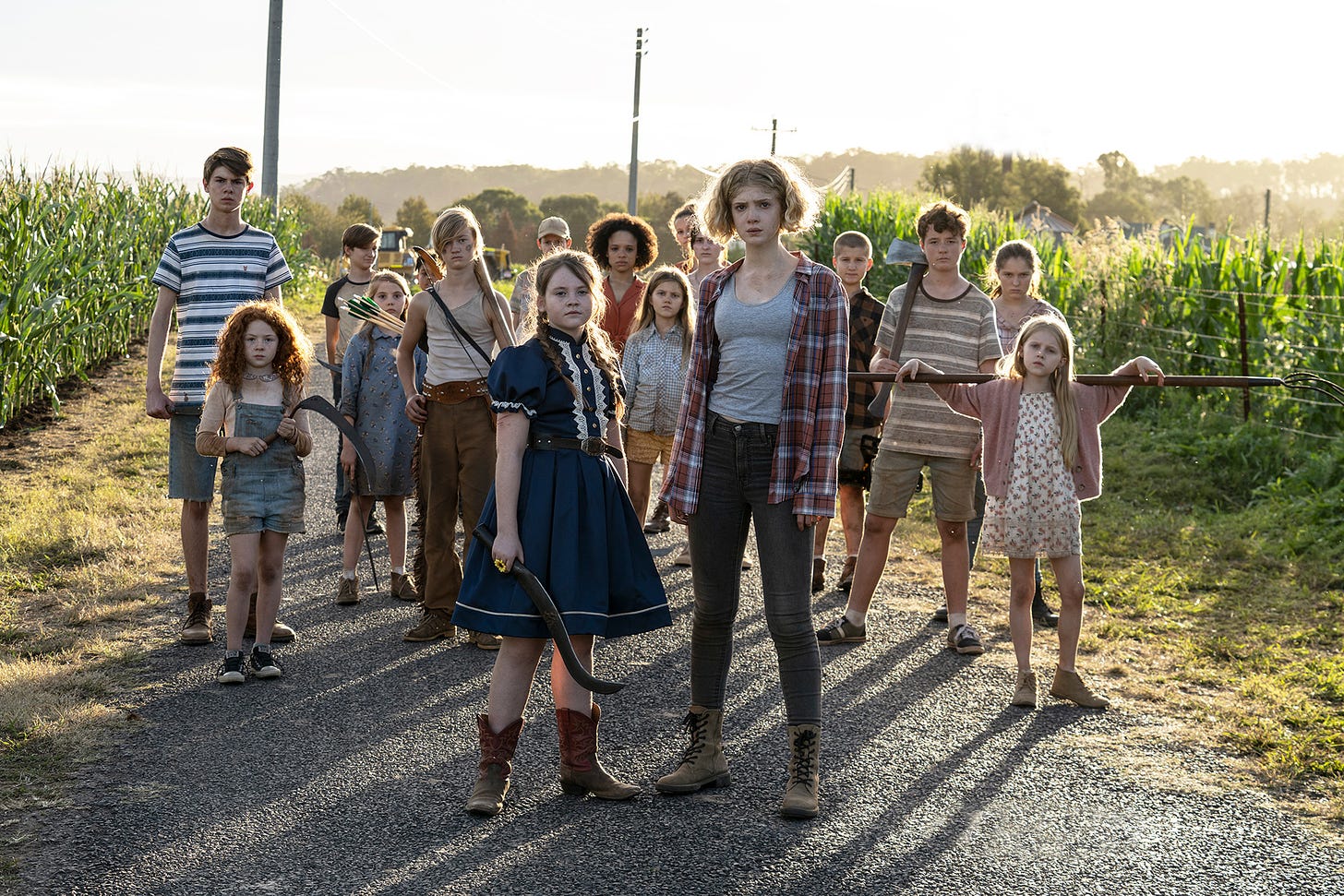
CHILDREN OF THE CORN [2023]
(now in theaters; VOD/Digital HD on 3/21)
You have to at least give writer/director Kurt Wimmer credit for trying something new. Rather than follow in the footsteps of the 1984 adaptation of Stephen King’s short story CHILDREN OF THE CORN, he decides to throw the entire plot away and give birth to his own creation atop the idea of a being “who walks behind the rows.” Think of this as a reboot—a prequel to a literal adaptation of King’s work in a sequel I assume won’t come despite the original spawning double-digit entries for an inexplicable franchise. Maybe Wimmer’s embracement of the short’s much darker tone will garner a new fan base while satisfying the old. Maybe a shoehorned, retooled theme of climate change and Boomers destroying the Earth for profit without a thought towards their children’s and grandchildren’s futures will be enough to replace the anti-evangelical message of the source. I just wish it didn’t have to be so generic.
Because much like writer George Goldsmith, Wimmer doesn’t see the appeal of King’s story as the terror of an unmoving and unfeeling horde acting on behalf of pure evil. Where the short moved past exposition to focus on effect and the nightmare born from hive mind indoctrination, all these filmmakers seem to see is the potential for children killing adults. And what better way is there to showcase that than manifesting the origin of a town gone wrong? Where the first adaptation did so by imagining how Isaac took control and instated Gatlin’s rules for “ascension” at age nineteen via a prologue, Wimmer chooses to make his imagining of that moment the entirety of his film. The names and motivations have been changed, but the result is the same: the corn is dying and the children are the only ones who care. So, they band together to murder all adults and take control.
The film is at its best when it lets itself become a monster movie with glimpses of “He Who Walks” filtered through a line of dialogue that posits the corn’s state of disrepair has fostered the growth of a fungus causing hallucinations. Is there really a creature in the stalks? Or has Eden (a very game Kate Moyer) let her sadistic mind get the best of her? Bo (Elena Kampouris) can’t really let the difference get in the way of the reality that she’s watching the town’s children become feral beasts ready and willing to violently dismember anyone who gets in Eden’s way regardless. All she can do is hope to stop the chaos before it’s too late—to appeal to consciences and protect the adults from certain death (regardless of their guilt insofar as being horribly sinful creatures in their own right).
It’s a bloody affair with effective special effects where the corn fields “coming to life” is concerned. Wimmer bites off more than he can chew upon finally giving an answer to the question of whether “He Who Walks” exists, but the more critical issue is Hollywood’s undying need to supply a hero. King rejected that inclination. His story excelled because it shined a light on humanity’s darkness and the fact that it was consuming more and more as time passed. What’s so wrong about letting that truth breathe? Why must we have a Bo who’s ready to fight no matter what as though audiences aren’t capable of processing hopelessness? All it does is ensure evil has a face: Eden. It ignores the prevalent abstract nature of greed and rage, saying that any horrors in this world can be defeated. It once again seeks to sanitize source material that refreshingly embraced the futility of our struggle to survive our own attempts at self-extermination.
- 4/10
CLOSE
(now on VOD/Digital HD; Belgium’s International Oscar submission)
The second half of Lukas Dhont’s CLOSE is definitely where it shines. I don’t want to ruin what occurs at the midway point (even if you have to be blind not to expect it), but its placement pretty much ensures that what comes before is destined to lose any autonomy outside of that result. Because this whole endeavor about dealing with “friendship and responsibility”—as the synopsis reads—demands a tragedy. It needs to drive a wedge between inseparable thirteen-year-olds Léo (Eden Dambrine) and Rémi (Gustav De Waele) to allow us to see what it is that results and what can be learned from the aftermath. So, we wade through the tension that adolescence and bullying ratchets up. We watch Léo pull away to stem the abuse and Rémi drown due to the way in which it’s accomplished. We await the inevitable to finally see what Dhont and co-writer Angelo Tijssens have in store.
It’s worth that wait in my opinion. Yes, those first forty or so minutes are somewhat inert as they blatantly set-up this fracturing bond, but the payoff ensures the sacrifice is worth the effort. Rémi is rendered little more than a pawn as a result, but that’s okay since the less we truly know about what is going on in his head beyond the obvious impulse to fight back and attempt to repair what has suddenly been lost the better. It allows the uncertain depression that follows to become the focal point by letting Léo and Rémi’s parents (Émilie Dequenne’s Sophie and Kevin Janssens’ Peter) twist in the wind as they reconcile their complicity with their confusion. Can they simply move on? Can they accept thier place in fostering this unspeakable act? Can they forgive themselves?
There’s a reason then why what follows this inevitability is mostly mundane in its content if not its context. Capitalist society doesn’t allow for a handful of gears to shutdown the whole machine. Adults must go back to work. Kids must go back to school so they can continue being indoctrinated by the system that demands they always go back to work. Léo pushes himself further towards the violence of his newfound hobby of hockey—embraced initially to help steer attention to his tight bond with Rémi away from lazy jests by classmates questioning whether they’re a couple. He buries his head in his parents’ farm work (Léa Drucker is a standout as Mom), desperately trying to take his mind off the thoughts bouncing around his head. And all he really wants to do is go back to the way things were.
CLOSE is therefore very subtle in its messaging. It lets Léo have an outburst against one of his bullies in a way that doesn’t explicitly place blame upon him, but lets us read between the lines to understand the emotional turmoil. That will probably turn some people off, thinking that nothing is going on. But know that there’s so much happening beneath the surface at all times. The way Léo and Sophie gulp down their water to avoid the subject that cannot be avoided forever speaks volumes in and of itself. It’s why you have to give Dambrine a lot of credit for his performance. Dequenne is fantastic, but he holds his own in the silences and whispers and thousand yard stares. Because grief isn’t just an adult response. It’s a human one that children aren’t absolved from needing to confront or dismantle. Pretending otherwise is a monumental mistake.
- 8/10
A LITTLE WHITE LIE
(now in limited theaters and on VOD)
Michael Maren’s A LITTLE WHITE LIE is a curious film. Adapted from Chris Belden’s novel SHRIVER, it tells the tale of a nobody handyman invited to be the guest of honor at a small college’s annual writers festival. Shriver (Michael Shannon) is justifiably perplexed. He knows it was sent in error, but he doesn’t know what to do. And rather than decline or simply ignore it altogether, he lets his friend Lenny (Mark Boone Junior) exacerbate things by accepting on his behalf. Why? Who knows? We often see Shriver fighting with another version of himself, so he might be schizophrenic. Or maybe just lonely? Either way, the moment he sees the defeat on his host Simone Cleary’s (Kate Hudson) face upon standing her up at the airport with cold feet, the guilt of not lying proves too much to bear.
Thus his adventure begins. Shriver playing Shriver. He knows nothing about writing. Nothing about the masterwork (GOAT TIME) this J.D. Salinger-esque recluse wrote to get so many people excited about an impromptu public appearance. Definitely nothing about the glad-handing and pomp and circumstance being a celebrity hounded for autographs, insight on manuscripts, and time demands. So, he takes Simone’s lead, becoming enamored by her modesty when it comes to her own writing and the enthusiasm she has to advance the craft through guests like “him” and Blythe Brown (Aja Naomi King) or Victor Bennet (Adhir Kalyan). Maybe he could be a writer too. Maybe he can learn something from them to better understand himself.
This aspect of the story is intriguing—especially the mirroring between Shriver’s duality insofar as being an imposter and the duality of the lead character in GOAT TIME (also named Shriver). The more he learns about the person he’s pretending to be, the more overlaps he finds. And the fact that he knows nothing about anything anyone is talking about when they laud or criticize “his” work allows him to respond with genuine contrition. Maybe his book was misogynist. Maybe it was something that should be left in the past—something the real Shriver perhaps distanced himself from having to defend by disappearing. As it is, Simone, T (Don Johnson), and Teresa (Romy Byrne) are simply ecstatic a Shriver is here to drum up interest. Until murder, pedophilia, bigotry, sexual assault, and comeuppance arrive.
Hence my label “curious.” Maren and Belden take us to some weird places for the gag while introducing even more familiar faces in Da’Vine Joy Randolph, Jimmi Simpson, Peyton List, Wendie Malick, Zach Braff, and M. Emmet Walsh. Does it all work? No. Does it undercut the psychological epiphany happening behind Shriver’s shakily uncertain façade? Yes. Not that the film treats what’s going on emotionally within his character with any semblance of the nuance necessary for it to truly say anything anyway. I guess that’s the real disappointment then: that the premise and underlying theme of self-discovery and worth is captivating. And that subplots dealing with misogyny definitely have the potential to augment them if they weren’t so superficially rendered. Shannon and Hudson are very good, though. Both trying their best to tether the surrounding chaos to the ground.
- 5/10
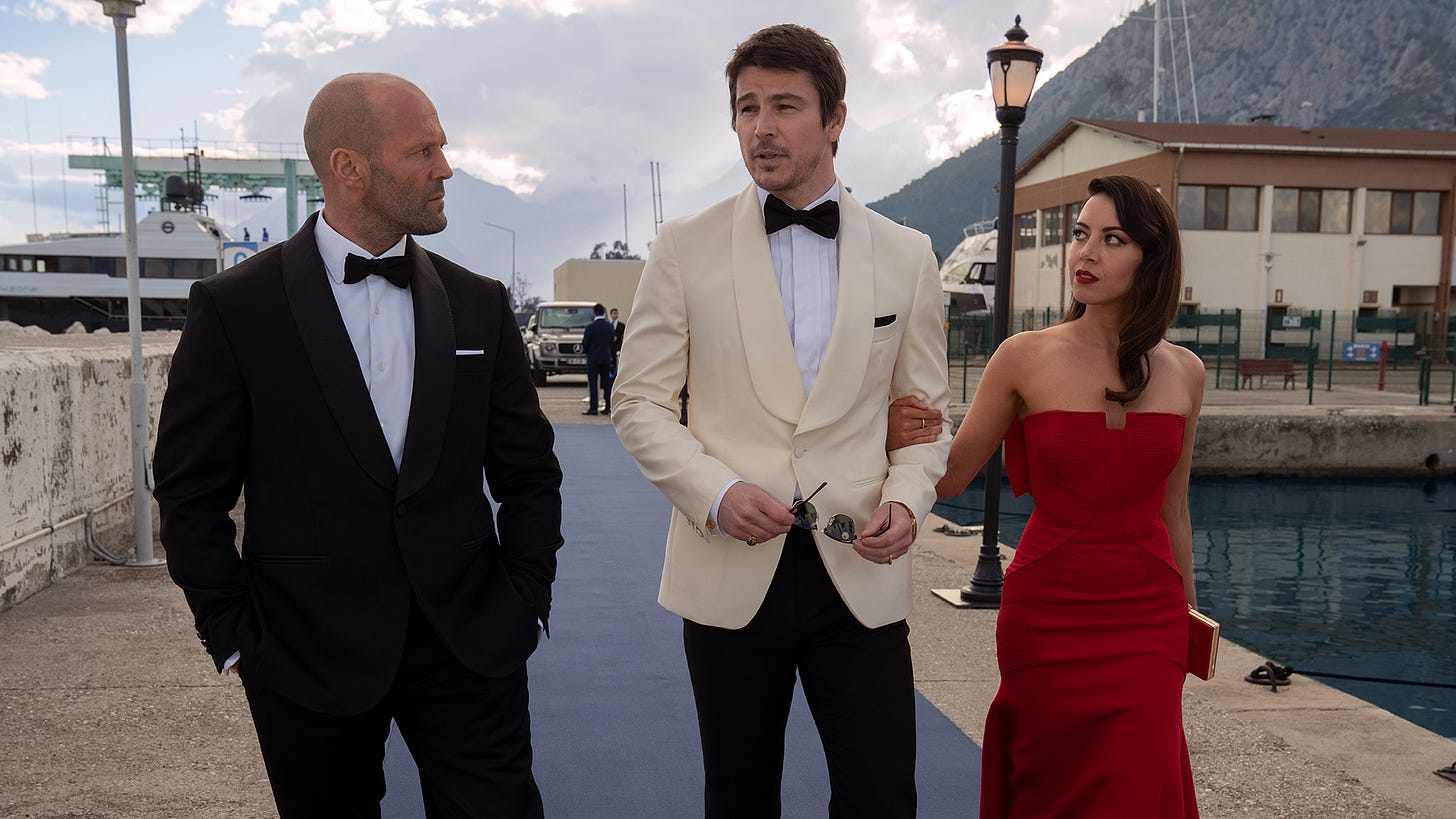
OPERATION FORTUNE: RUSE DE GUERRE
(now in theaters)
I think I heard bad things about Guy Ritchie’s OPERATION FORTUNE: RUSE GE GUERRE. Maybe they were a product of its delay (which seems more to do with a changing of hands between STX and Lionsgate than quality issues). Maybe they could be attributed to people enjoying taking the piss out of Ritchie. Maybe I just misremembered. Whatever the case, me being a Guy Ritchie apologist (I don’t think I’ve ever disliked one of his films even if none have matched the height of SNATCH) means I'm going in ready to have a good time regardless. And while Cary Elwes appearing on-screen with a determined gait crosscut against an explosive heist might have instantaneously cemented my investment because I’m binging PSYCH and loving his recurring cameo, I was nevertheless onboard and eating up the fast-paced and quippy opening exposition dump hand over fist.
Recruiting Elwes as the ever-cool-under-pressure yet always-exasperated-by-his-team’s-shenanigans general of a British-sanctioned, off-the-books freelance outfit is inspired casting. He plays Nathan Jasmine, recruited by Eddie Marsan’s government agent to retrieve what was stolen from said heist, determine its buyer, and figure out what it was. That’s right. They don’t know what’s missing. Only that it’s created a black market buzz with numbers like ten billion dollars being bandied about. His first hire is his trusted liability of a badass, phobia-riddled (as an excuse to run up Her Majesty’s bill on exorbitantly priced wine while flying) right-hand Orson Fortune (Jason Statham). On tech is newcomer Sarah Fidel (Aubrey Plaza), recently unemployed after Nathan’s usual guy was poached by her former boss—rival black ops general Mike (Peter Ferdinando). And rounding out the team is JJ Davies’ (Bugzy Malone) Swiss Army knife bruiser.
Add an out-of-his-element movie star (not to be confused with “actor”) named Danny Francesco (a hilarious Josh Hartnett), charismatic billionaire arms dealer Greg Simmonds (Hugh Grant), and a couple tech moguls trying hard (and failing) to fit in with a dark world of cutthroat violence and you can imagine the type of hijinks Ritchie and his co-writers Ivan Atkinson and Marn Davies have in store. A twisty action-thriller despite containing few to no real surprises where motives and reveals are concerned, it’s true worth is its characters’ rapport. Orson busting everyone’s chops. Sarah’s inability to stop her justified ego and penchant for sarcasm to drive her retorts. And the brilliant bromance between Danny and Greg that forms naturally despite the former being completely terrified to enter this world after being blackmailed into helping. I earnestly laughed out loud often.
It’s therefore not in the vein of his last film WRATH OF MAN so those who thought Ritchie had gone serious shouldn’t worry. It’s not as polished as THE MAN FROM U.N.C.L.E. either. If I could put it into a box I’d say it’s his attempt at a MISSION: IMPOSSIBLE filtered through the humorous lens utilized on THE GENTLEMEN. The bad men are BAD, but they’re mostly here as toys with which Statham and company can play. Tell Orson that the person he’s about to fight is as ruthless as they come and he rolls his eyes about only wanting to know the guy’s name, not his dossier. Because skills and reputation don’t matter until they do and only for those who are on the poster. To Orson, Nathan, and even Greg, this is all a game wherein betrayal can be forgiven for the price of genuine enthusiasm or blackmail material. It may not be enough to petition for a sequel, but it’s a lot of fun for fans of Ritchie’s usual formula.
- 7/10
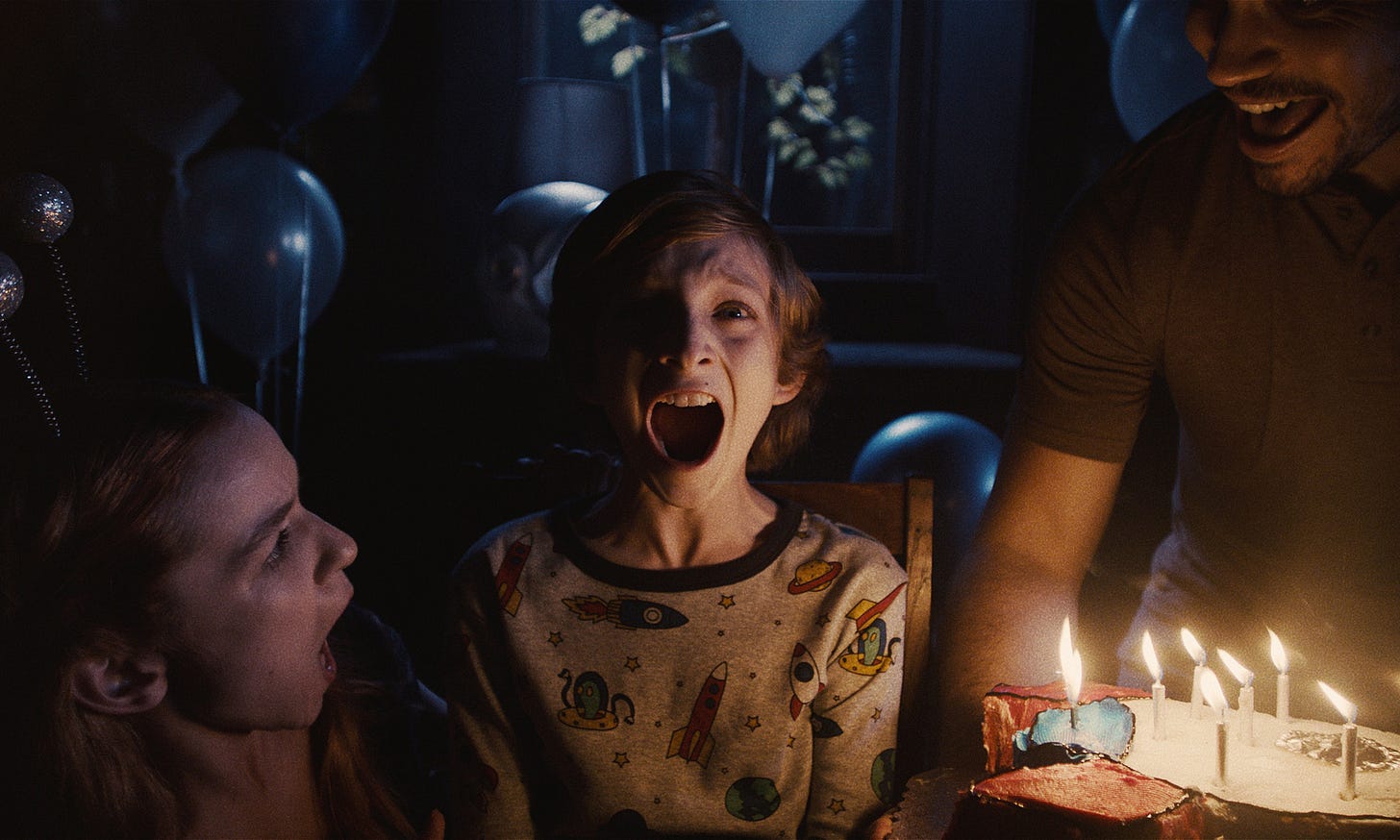
SPOONFUL OF SUGAR
(now streaming on Shudder)
Despite being her second feature (I enjoyed FIXATION out of TIFF last year a lot), Mercedes Bryce Morgan’s SPOONFUL OF SUGAR has reached the public first. It’s a doozy of a film—not because of any graphic nature or its subject matter, but because there’s so much going on that it becomes almost impossible to latch onto anyone or anything on-screen. Leah Saint Marie’s script is touching on the relationship between sex and violence. The hallucinogenic properties of LSD in an emotionally disturbed person. The suburban underbelly of dark secrets behind white picket fences. And the lengths a mother will go to prove her love to her child. Lengths that include the complete destruction of her own body and soul.
With that laundry list of themes comes a disjointed compilation of viewpoints too. Three-quarters of the film is from Millicent’s (Morgan Saylor) perspective, the newly hired babysitter of a desperate family at wit’s end when it comes to their mute, violent, allergic-to-the-world son Johnny (Danilo Crovetti). The other quarter focusing on the boy’s mother Rebecca (Kat Foster), a self-help author with understandable rage issues stemming from the unreliable men in her life: Johnny and husband Jacob (Myko Olivier). The latter two ultimately become objects in these women’s psycho-sexual games. He who needs nurturing and he who needs stimulating. Lines blur, boundaries are crossed, and the mirroring between desire and necessity confuse all involved with the help of Millicent’s psychedelic prescription.
There are definitely some intriguing moments (Millicent’s psychiatrist, as played by Keith Powell, inexplicably losing his finger during a session showing how much of what we see is filtered through her perpetual state of intoxication) and worthwhile commentary about double-standards and how abused people abuse others, but so much of it arrives as shock value without depth. We move from one scene to the next with little to no context until an exposition dump of Millicent’s baggage provides easy answers and a last-second (but hardly surprising) reveal where it concerns Johnny and his parents supplies a hamfisted “twist” that only undercuts things further. It’s all style above substance with the pairing of melodramatic impulses and Saylor’s eccentric performance bringing to mind Lucky McKee’s MAY. I wanted it all to fit together, but it sadly never does.
- 4/10
WHEN WILL IT BE AGAIN LIKE IT NEVER WAS BEFORE
(premiered at the 2023 Berlin International Film Festival)
You may think your upbringing was crazy, but how much wilder would it have been if you were raised in a psychiatric clinic? That’s what Joachim Meyerhoff had to deal with—a subject of which he wrote about in his autobiography WHEN WILL IT BE AGAIN LIKE IT NEVER WAS BEFORE. Director Sonja Heiss (who co-adapted with Lars Hubrich) received a copy as a gift and found it unlike most German novels she’d ever read, laughing out loud at multiple points while also being profoundly moved by its insight. She captures a lot of that duality with her cinematic iteration, letting the eccentrically “free-spirited” life this family lives (for better and, unfortunately, worse) speak for itself as a series of memorably anecdotal gags tied together by Josse’s (Camille Moltzen at 7, Arsseni Bultmann at 14, and Merlin Rose at 25) unique perspective as its circus’ youngest member.
Richard Meyerhoff (Devid Striesow) is the hospital’s director and thus lives onsite with his wife (Laura Tonke’s Iris) and three sons (Josse, Philip and Patrick). They each know the patients well as no one is really confined to any one area of the campus. A young boy roams around with his toy gun. The so-called “Bell Ringer” shuffles around in silence, the sound of his instruments always ensuring you know when he’s near—a prospect that simultaneously instills fear in young Josse and comfort once becoming friends. The patients are ostensibly part of the family with some celebrating occasions in their home like guests to a cocktail party. That belief in fostering a sense of normality comforts Richard. Despite Iris playing along with a smile, however, we know she yearns for more. For an escape that will prove longer and farther away than an afternoon at the beach.
And thus the seeds of discontent are set. Richard and Iris love their boys (even having to deal with Josse’s anger issues that necessitate sitting him on top of a running washer to calm him down), but their own relationship frays. She rightfully feels like a forgotten accessory, her only real pleasure coming from long conversations on the phone with an old flame in Italy. He lives his life on the basis that failure can be avoided—to the point of pretending his obvious and public failures never happened. We can therefore gauge the temperature of this home simply by looking at their bedroom. Are the two beds pushed together to allow for closeness and Josse as a nightly guest? Have they been pushed apart ever so slightly? Or are they on complete opposite ends of the room?
Experiencing that shift from Josse’s eyes renders the narrative into a coming-of-age tale spanning decades of his admittedly weird adolescence. He’s witnessing the dissolution of his parent’s love (culminating in a Christmas for the ages that turns from darkly humorous to heartbreakingly tragic with a scream) while acknowledging his own romantic inclinations with the pretty girls who arrive as patients—a development his brothers have a lot of fun with considering they’ve always considered him the black sheep dullard of the group who has more in common with the residents than them. Even that desire for companionship finds itself mired under a dark cloud of anguish, though. How could it not when faced with the unfortunate circumstances that surround mental illness, narcissism, and death?
Heiss handles these tonal shifts very well with an excellent cast of young actors (Bultmann and Casper von Bülow as teen Philip are standouts) bolstered by commanding, emotionally complex turns from Striesow and especially Tonke. The result may not be for everyone as a majority of the opening portion feels more like skits cobbled together (moments like Josse discovering a body on the way to school having a punchline rather than a lesson) than a cohesive throughline, but the teen years really make up for any of that one-dimensionality. And the closing chapter (adulthood only gets about fifteen minutes at the end) nicely brings everything together with hindsight to remember that we often can’t recognize our own part in our unhappiness in-the-moment. We can only hope clarity and forgiveness comes before it’s too late.
- 7/10
Cinematic F-Bomb -
MY BLUE HEAVEN was a staple of my adolescence before ever hearing about GOODFELLAS thanks in large part to Steven Martin. (Substack apparently can’t handle an embedded gif, so you’ll have to click over for a smoother experience. Or see everything at cinematicfbombs.com.)


New Releases This Week:
(Review links where applicable)
Opening Buffalo-area theaters 3/3/23 -
CHILDREN OF THE CORN at Regal Galleria, Transit & Quaker Crossing (select times, only until Saturday)
Thoughts are above.
CREED III at Dipson McKinley Mall, Flix & Capitol; AMC Maple Ridge & Market Arcade; Regal Elmwood, Galleria, Transit & Quaker Crossing
DEMON SLAYER: KIMETSU NO YAIBA - TO THE SWORDSMITH VILLAGE at North Park Theatre; Dipson Capitol; Regal Galleria, Transit & Quaker Crossing
OPERATION FORTUNE: RUSE DE GUERRE at Dipson Flix & Capitol; AMC Maple Ridge & Market Arcade; Regal Elmwood, Galleria, Transit & Quaker Crossing
Thoughts are above.
RRR FAN CELEBRRRATION at AMC Market Arcade
“With crazy choreographed fights, a ton of romance and humor, wall-to-wall computer effects, and the most homo-erotic leading duo since POINT BREAK, what's not to love about this historical-set fantasy?” – Full thoughts at HHYS.
Streaming from 3/3/23 -
LOVE AT FIRST KISS - Netflix on 3/3
CHRIS ROCK: SELECTIVE OUTRAGE - Netflix on 3/4
HISTORY OF THE WORLD, PART II - Hulu on 3/6
FARAWAY - Netflix on 3/8
Now on VOD/Digital HD -
ALL THE BEAUTY AND THE BLOODSHED (2/28)
“[Goldin's] words and this movie look to break through the silence of repression and fear to ensure the next generations have the tools to survive.” – Full thoughts at HHYS.
MAGIC MIKE’S LAST DANCE (2/28)
A MAN CALLED OTTO (2/28)
“It's ultimately redundant since OVE is so effective. But it's pretty good where English-language remakes are concerned.” – Full thoughts at HHYS.
MANDRAKE (2/28)
THE PARK (3/2)
CLOSE (3/3)
Thoughts are above.
CONSECRATION (3/3)
“It's the age-old conundrum: are evil deeds truly sinful if they are performed in the name of God? Who's to say [Catholics] haven't been fooled by the Devil since the first words of the Bible were written down?” – Full thoughts at HHYS.
THE DEVIL CONSPIRACY (3/3)
DONOR PARTY (3/3)
LIVING (3/3)
“While perhaps less weighty in its drama, these decisions do allow Nighy to be the central driving force above plot (an Oscar nomination should be forthcoming). LIVING is about Williams learning the lessons shared rather than the lessons themselves.” – Full thoughts at HHYS.
PALM TREES AND POWER LINES (3/3)
“Depicting [sexual grooming] is neither entertaining nor exciting. Dack can therefore push her narrative forward with methodical precision instead.” – Full thoughts at jaredmobarak.com.
TRANSFUSION (3/3)
THE YEAR BETWEEN (3/3)





